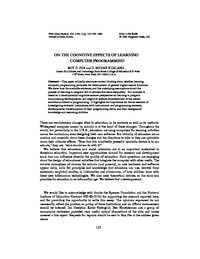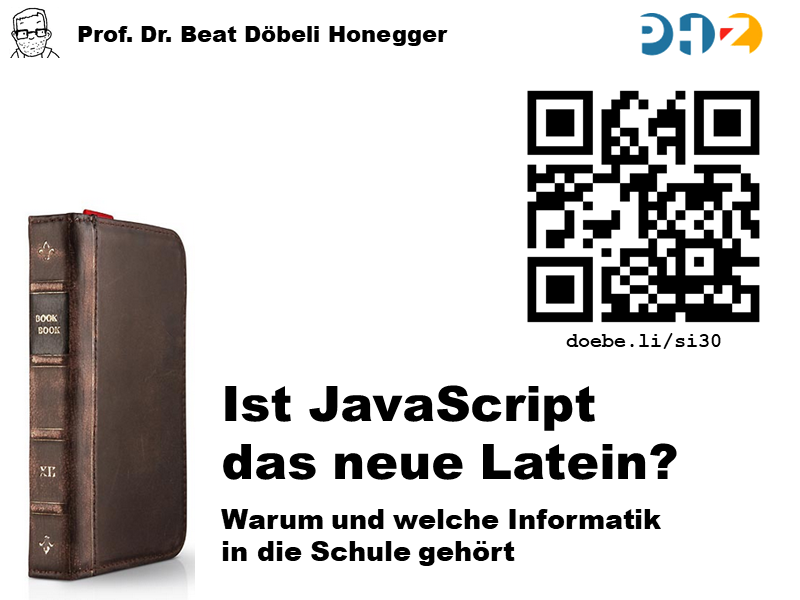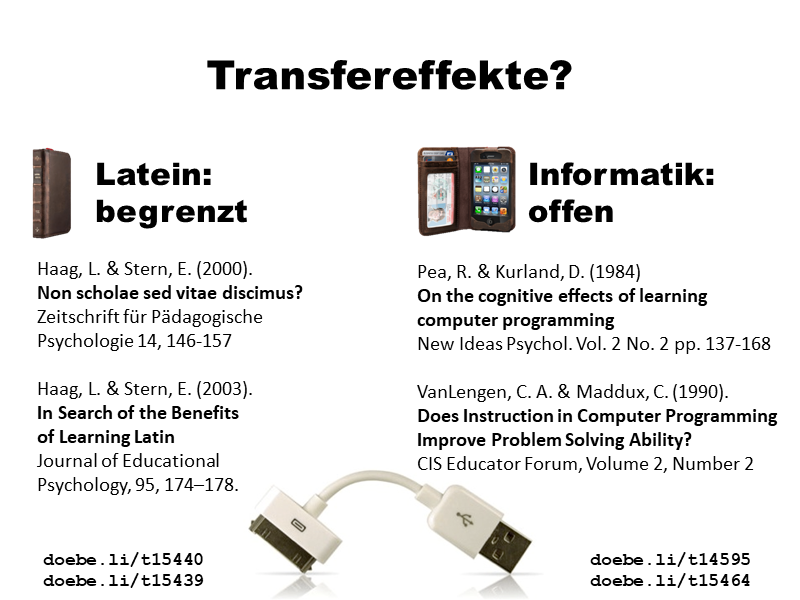On the cognitive effects of learning computer programmingErstpublikation in: New Ideas Psychol. Vol. 2 No. 2 pp. 137-168, 1984
Publikationsdatum:
|
 |
 Diese Seite wurde seit 2 Jahren inhaltlich nicht mehr aktualisiert.
Unter Umständen ist sie nicht mehr aktuell.
Diese Seite wurde seit 2 Jahren inhaltlich nicht mehr aktualisiert.
Unter Umständen ist sie nicht mehr aktuell.
 Zusammenfassungen
Zusammenfassungen
Pea and Kurland failed to find support for the idea that a year of Logo activities improved children’s strategic planning skills.
Von Richard E. Mayer, Jennifer L. Dyck, William Vilberg im Text Learning to program and learning to think: what's the connection? (1986) auf Seite 606Pea and Kurland (1984) found no problem-solving transfer based on programming language instruction. Fourth- and sixth-grade students did not show significant problem-solving and planning increases after Logo instruction. The authors also remark that specific and near problem-solving transfer may not occur through programming language instruction. They found that high school students failed to develop problem-solving skills within the Logo programming domain.
Von David B. Palumbo im Text Programming Language/Problem-Solving Research (1990)  This paper critically examines current thinking about whether learning
computer programming promotes the development of general higher mental functions.
We show how the available evidence, and the underlying assumptions about the
process of learning to program fail to address this issue adequately. Our analysis is
based on a developmental cognitive science perspective on learning to program
incorporating developmental and cognitive science considerations of the mental
activities involved in programming. It highlights the importance for future research of
investigating students’ interactions with instructional and programming contexts,
developmental transformation of their programming skills, and their background
knowledge and reasoning abilities.
This paper critically examines current thinking about whether learning
computer programming promotes the development of general higher mental functions.
We show how the available evidence, and the underlying assumptions about the
process of learning to program fail to address this issue adequately. Our analysis is
based on a developmental cognitive science perspective on learning to program
incorporating developmental and cognitive science considerations of the mental
activities involved in programming. It highlights the importance for future research of
investigating students’ interactions with instructional and programming contexts,
developmental transformation of their programming skills, and their background
knowledge and reasoning abilities. Bemerkungen
Bemerkungen
 A series of
smaller studies conducted by Roy Pea and
Midian Kurland (1984) is often referenced
as the sole evidence that learning Logo programming
did not produce any transferable
effects. These studies had several methodological
issues; for example, neglecting to
consider the length of time spent learning
programming and the type of programs created.
A series of
smaller studies conducted by Roy Pea and
Midian Kurland (1984) is often referenced
as the sole evidence that learning Logo programming
did not produce any transferable
effects. These studies had several methodological
issues; for example, neglecting to
consider the length of time spent learning
programming and the type of programs created. Dieser wissenschaftliche Zeitschriftenartikel erwähnt ...
Dieser wissenschaftliche Zeitschriftenartikel erwähnt ...
 Personen KB IB clear | Benedict du Boulay , Mark E. Hoffman , Stephen Johnson , John Monk , Donald A. Norman , Tim O'Shea , Seymour Papert , Harvey Siegel , David R. Vance , Lew Semjonowitsch Vygotsky , Christopher Winch | |||||||||||||||||||||||||||||||||||||||||||||||||||||||||||||||
 Aussagen KB IB clear | Informatik/Programmieren/Logo/Javascript ist das neue Latein
Problemlöseargument: Informatikkenntnisse helfen auch beim Lösen von Problemen ausserhalb der Informatikproblem solving argument: knowledge in computer science fosters problem solving | |||||||||||||||||||||||||||||||||||||||||||||||||||||||||||||||
 Begriffe KB IB clear |  Denken Denken thinking
, Kognitionswissenschaftcognitive science
, thinking
, Kognitionswissenschaftcognitive science
,  Lernen Lernen learning
, learning
,  Programmieren Programmieren programming programming
| |||||||||||||||||||||||||||||||||||||||||||||||||||||||||||||||
 Bücher |
| |||||||||||||||||||||||||||||||||||||||||||||||||||||||||||||||
 Texte |
|
 Vorträge von Beat mit Bezug
Vorträge von Beat mit Bezug
 Zitationsgraph
Zitationsgraph
 Zitationsgraph (Beta-Test mit vis.js)
Zitationsgraph (Beta-Test mit vis.js)
 Zeitleiste
Zeitleiste
 33 Erwähnungen
33 Erwähnungen 
- Transfer of Cognitive Skills from Programming: When and How? (Gavriel Salomon, David N. Perkins)


- On the Cognitive Prerequisites of Learning Computer Programming - Technical Report No. 18 (Roy Pea, D. Midian Kurland) (1983)


- Logo Programming and Problem Solving (Roy Pea) (1983)


- Logo Programming and the Development of Planning Skills - Technical Report No. 16 (Roy Pea, D. Midian Kurland) (1984)


- Language‐Independent Conceptual «Bugs» in Novice Programming (Roy Pea) (1986)


- Studying the Novice Programmer (Elliot Soloway, Jim Spohrer) (1988)


- Learning to program and learning to think: what's the connection? (Richard E. Mayer, Jennifer L. Dyck, William Vilberg) (1986)


- Learning to program and learning to think: what's the connection? (Richard E. Mayer, Jennifer L. Dyck, William Vilberg) (1986)
- Are Cognitive Skills Context-Bound? (David N. Perkins, Gavriel Salomon) (1989)


- Does Instruction in Computer Programming Improve Problem Solving Ability? (Craig A. VanLengen, Cleborne D. Maddux) (1990)


- Programming Language/Problem-Solving Research - A Review of Relevant Issues (David B. Palumbo) (1990)


- Can computer programming improve problem-solving ability? (Jho-Ju Tu, John R. Johnson) (1990)


- Minds in Play - Computer Game Design As A Context for Children's Learning (Yasmin B. Kafai) (1995)


- CSCL - Theory and Practice of an Emerging Paradigm (Timothy D. Koschmann) (1996)
- Paradigm shifts and instructional technology - An introduction


- Paradigm shifts and instructional technology - An introduction
- The Journal of the Learning Sciences 6(4) (1997)
- Why School Reform Is Impossible (Seymour Papert) (1997)


- Mindstorms 2 (Tim O'Shea)


- Logo-as-Latin Redux (Timothy D. Koschmann)

- Why School Reform Is Impossible (Seymour Papert) (1997)
- Computer Science Education Research (Sally Fincher, Marian Petre) (2004)
- The Cambridge Handbook of the Learning Sciences (R. Keith Sawyer) (2006)

- Computational thinking and tinkering - Exploration of an early childhood robotics curriculum (Marina Umaschi Bers, Louise P. Flannery, Elizabeth R. Kazakoff) (2014)


- The ICAP Framework - Linking Cognitive Engagement to Active Learning Outcomes (Michelene T. H. Chi, Ruth Wylie) (2014)


- ICER 2015 - Proceedings of the eleventh annual International Conference on International Computing Education Research, ICER 2015, Omaha, NE, USA, August 09 - 13, (Brian Dorn, Judy Sheard, Quintin I. Cutts) (2015)
- Fourth Grade Students Reading Block-Based Programs - Predictions, Visual Cues, and Affordances (Hilary A. Dwyer, Charlotte Hill, Alexandria K. Hansen, Ashley Iveland, Diana Franklin, Danielle Harlow) (2015)


- Fourth Grade Students Reading Block-Based Programs - Predictions, Visual Cues, and Affordances (Hilary A. Dwyer, Charlotte Hill, Alexandria K. Hansen, Ashley Iveland, Diana Franklin, Danielle Harlow) (2015)
- Learner-Centered Design of Computing Education - Research on Computing for Everyone (Mark Guzdial) (2015)


- Coding Literacy - How Computer Programming Is Changing Writing (Annette Vee) (2017)

- Remaining Trouble Spots with Computational Thinking - Addressing unresolved questions concerning computational thinking. (Peter Denning) (2017)


- Tomorrow's Learning: Involving Everyone. Learning with and about Technologies and Computing - 11th IFIP TC 3 World Conference on Computers in Education, WCCE 2017, Dublin, Ireland, July 3-6, 2017 (Arthur Tatnall, Mary Webb) (2017)


- 59. Constructive Interaction on Collaborative Programming - Case Study for Grade 6 Students Group (Sayaka Tohyama, Yoshiaki Matsuzawa, Shohei Yokoyama, Teppei Koguchi, Yugo Takeuchi)


- 59. Constructive Interaction on Collaborative Programming - Case Study for Grade 6 Students Group (Sayaka Tohyama, Yoshiaki Matsuzawa, Shohei Yokoyama, Teppei Koguchi, Yugo Takeuchi)
- ICER 2017 - Proceedings of the 2017 ACM Conference on International Computing Education Research, ICER 2017, Tacoma, WA, USA, August 18-20, 2017 (Josh Tenenberg, Donald Chinn, Judy Sheard, Lauri Malmi) (2017)
- Conceptions and Misconceptions about Computational Thinking among Italian Primary School Teachers (Isabella Corradini, Michael Lodi, Enrico Nardelli) (2017)


- Conceptions and Misconceptions about Computational Thinking among Italian Primary School Teachers (Isabella Corradini, Michael Lodi, Enrico Nardelli) (2017)
- Concepts before coding - non-programming interactives to advance learning of introductory programming concepts in middle school (Shuchi Grover, Nicholas Jackiw, Patrik Lundh) (2019)


- The Cambridge Handbook of Computing Education Research (Sally Fincher, Anthony V. Robins) (2019)

- Making sense of making - critical issues in the integration of maker education into schools (Anna-Lena Godhe, Patrik Lilja, Neil Selwyn) (2019)


- ICER 2019 - Proceedings of the 2019 ACM Conference on International Computing Education Research, ICER 2019, Toronto, ON, Canada, August 12-14, 2019 (Robert McCartney, Andrew Petersen, Anthony V. Robins, Adon Moskal) (2019)
- From Theory Bias to Theory Dialogue - Embracing Cognitive, Situated, and Critical Framings of Computational Thinking in K-12 CS Education (Yasmin B. Kafai, Chris Proctor, Debora Lui) (2019)


- From Theory Bias to Theory Dialogue - Embracing Cognitive, Situated, and Critical Framings of Computational Thinking in K-12 CS Education (Yasmin B. Kafai, Chris Proctor, Debora Lui) (2019)
- The Charisma Machine - The Life, Death, and Legacy of One Laptop per Child (Morgan Ames) (2019)

- Designing Constructionist Futures - The Art, Theory, and Practice of Learning Designs (2020)

- Computer programming skills - A cognitive perspective (Irene Graafsma) (2021)
- Teaching Coding in K-12 Schools - Research and Application (Therese Keane, Andrew Fluck) (2023)


- Teaching Coding in Kindergarten - Supporting Students’ Activity with Robot Coding Toys (Jessica F. Shumway, Jody Clarke-Midura, Victor R. Lee, Deborah Silvis, Lise E. Welch Bond, Joseph S. Kozlowski)


- Teaching Coding in Kindergarten - Supporting Students’ Activity with Robot Coding Toys (Jessica F. Shumway, Jody Clarke-Midura, Victor R. Lee, Deborah Silvis, Lise E. Welch Bond, Joseph S. Kozlowski)
 Volltext dieses Dokuments
Volltext dieses Dokuments
 |  On the cognitive effects of learning computer programming: Artikel als Volltext ( On the cognitive effects of learning computer programming: Artikel als Volltext ( : :  , 112 kByte; , 112 kByte;  : :  2021-03-21) 2021-03-21) |
 Anderswo suchen
Anderswo suchen 
 Beat und dieser wissenschaftliche Zeitschriftenartikel
Beat und dieser wissenschaftliche Zeitschriftenartikel
Beat hat Dieser wissenschaftliche Zeitschriftenartikel während seiner Zeit am Institut für Medien und Schule (IMS) ins Biblionetz aufgenommen. Beat besitzt kein physisches, aber ein digitales Exemplar. Eine digitale Version ist auf dem Internet verfügbar (s.o.). Beat hat Dieser wissenschaftliche Zeitschriftenartikel auch schon in Vorträgen erwähnt.
















 Biblionetz-History
Biblionetz-History